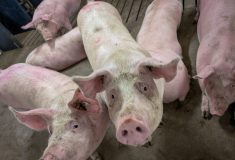BEIJING (Reuters) — China plans to increase its oversight of genetically modified crops due to heightened public concern over Beijing’s ability to keep illegal GM products out of the food chain.
Beijing supports genetically modified organisms (GMO) technology, which it sees as crucial to future food security. But critics have alleged the technology could pose health risks, and while China allows imports of some GMO crops it is yet to permit domestic cultivation of GM food crops.
The planned changes to China’s safety administration regulation do not alter its GMO policy but will increase the supervision of biotech products under development, said Huang Dafang, professor at the Biotechnology Research Institute under the Chinese Academy of Agricultural Sciences.
Read Also

New Quebec ag minister named in shuffle
Farmers in Quebec get a new representative at the provincial cabinet table as Premier Francois Legault names Donald Martel the new minister of agriculture, replacing Andre Lamontagne.
The revisions, published by the agriculture ministry on its website on Monday, stress the primary responsibility of research institutes to ensure that GMO products are developed according to safety rules.
They also require organizations doing research and testing on GMOs to clearly document each procedure. Agriculture officials at county and town level will also need to increase supervision of GMO trials.
“The ministry couldn’t manage everything so it wants lower levels to help them oversee things,” said Huang.
Last year the ministry launched a media campaign to inform the public about the science behind GMOs after a wave of negative reports around the technology.
But anti-GMO sentiment remains. The ministry was recently sued by members of the public for its alleged lack of transparency in approvals of GMO and related products, underlining the lack of confidence in its ability to guarantee safe food.
Proponents of biotech crops in China argue that commercializing GMO products will reduce the need for farmers to resort to unapproved varieties to boost their yields.














